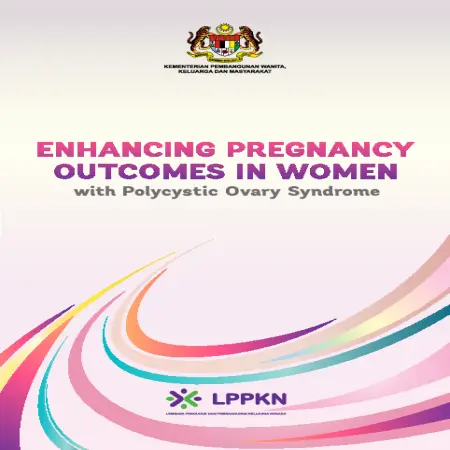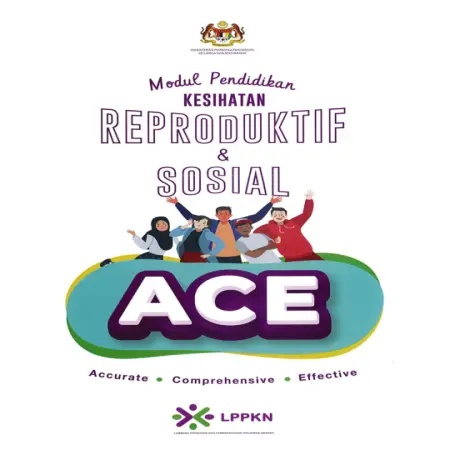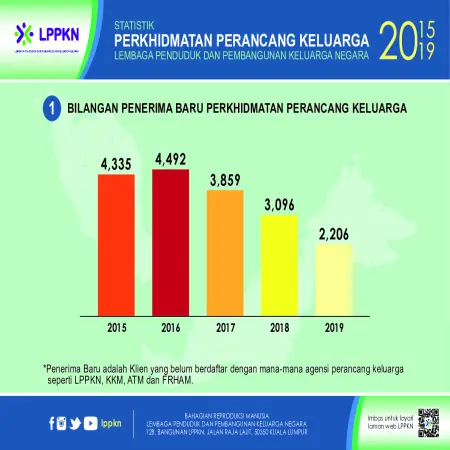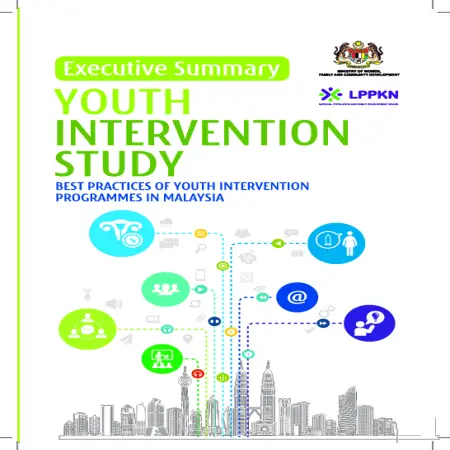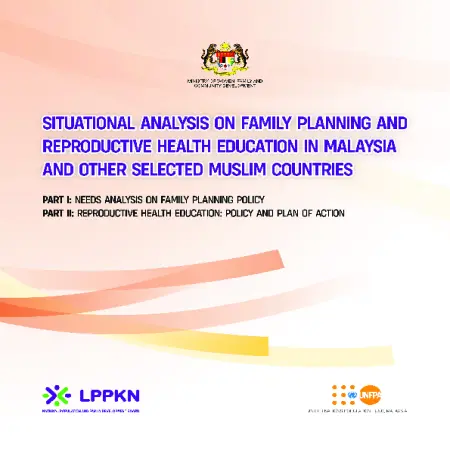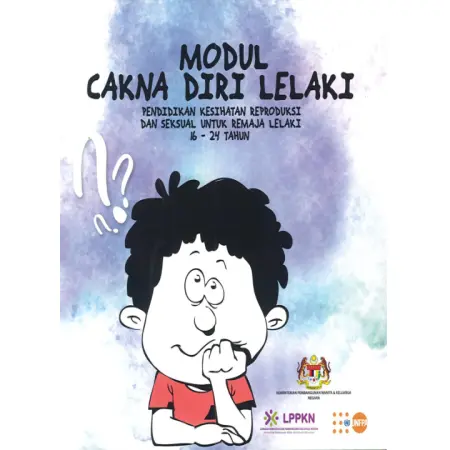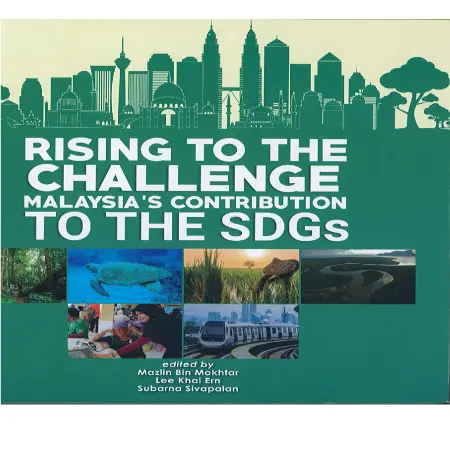Browse by Division/Agency
Results for Division/Agency : "LPPKN - National Population and Family Development Board, Malaysia: Human Reproductive Division"
|
|
Cepat Tahu, Cepat Tindak
Item Type: Video
Editor:
Year: 00/01/2023
Abstract: Educational video regarding the importance of undergoing a mammogram test which is an examination to detect the early stages of breast cancer while the HPV DNA test is a test to detect the Human Papillomavirus (HPV) that is infected through sexual contact. Cervical cancer is cancer at the base of the uterus caused by HPV.
|
|
|
|
|
|
Enhancing Pregnancy Outcomes in Women with Polycystic Ovary Syndrome
Item Type: Research Report
Editor:
Year: 00/01/2023
Abstract: Polycystic ovary syndrome or known as polycystic ovarian syndrome (PCOS) is an endocrine disorder and one of the main causes of anovulatory infertility in women of reproductive age, which is 15 to 49 years (Balen et al., 2016). The main characteristics of women with PCOS are ovarian dysfunction, hyperandrogenism and polycystic ovaries (Balen and Michelmore., 2002). This syndrome is associated with metabolic syndromes such as obesity, insulin resistance, diabetes mellitus type 1 (Barthemess and Naz., 2014) and arteriosclerosis (Orio et al., 2004).
The general objective of this study is to identify the demographic characteristics, clinical and medical history, of PCOS sufferers as well as appropriate treatment methods among clients seeking fertility treatment at the LPPKN Subfertility Clinic.
This study is an experimental, case control study involving female clients who come to seek fertility treatment at the LPPKN Subfertility Clinic. The chosen location is LPPKN Headquarters, Kuala Lumpur. Every female client who attends needs to meet the patient selection criteria, namely a Malaysian couple, trying to conceive for more than a year and aged between 25 to 38 years old. Every patient who faces subfertility problem is divided into two groups, namely PCOS and no PCOS.
Patients who are eligible and agree to participate in the study have gone through at least five (5) series of appointments with medical officers and nurses. A total of 167 patients participated in this study with an average age of 30 years.
|
|
|
|
|
|
Modul Pendidikan Kesihatan Reproduktif dan Sosial ACE (Accurate, Comprehensive, Effective)
Item Type: Module
Editor:
Year: 00/01/2022
Abstract: LPPKN published an intervention module called Module ACE – Accurate, Comprehensive and Effective on 2021 as a product from The Youth Intervention Study: Best Practices for Youth Intervention Programs that was carried out in 2016. This module is suitable to be used for adolescents age 10 to 24 years old.
The ACE module covers comprehensive reproductive health and sexuality education which includes legislation on sexual violence, gender equality and human trafficking. The module has been implemented on targeted groups consist of youths and peer educators, and proven to expand their knowledge on reproductive health. The activities from the module are delivered using pedagogy method that encourage on two-way interaction and responsiveness.
|
|
|
|
|
|
Statistik data perkhidmatan perancang keluarga LPPKN tahun 2015-2019
Item Type: Report
Editor:
Year: 00/00/2022
Abstract: National Population and Family Development Board Malaysia (NPFDB) have prepared a statistic report on family planning services at the NPFDB level according to the number of new recipients, type of contraceptive, state, age group, ethnicity, strata and employment status for 2015 to 2019. This report only consist new recipients, which is new clients who have not registered with any of family planning agency such as NPFDB, Ministry of Health (MOH), Malaysian Armed Forces (ATM) and Federation of Reproductive Health Associations Malaysia (FRHAM). The breakdown of statistic report by type of contraceptive have included implant, injection, condom, pill, intrauterine device and non-modern methods. Meanwhile, the breakdown of family planning data by age have covered the range of 15 years to 49 years. The breakdown of data by ethnicity also have included Malay, Chinese, Indian, other bumiputera and other ethnicities. These statistic data were also have provided by strata (urban and rural), employment status (employed and unemployed) and education breakdown including college/ university, secondary school, primary school and non formal education.
|
|
|
|
|
|
Executive Summary: youth intervention study: best practices of youth intervention programmes in Malaysia
Item Type: Research Report
Editor:
Year: 01/07/2020
Abstract: In the decades, Malaysia has undergone rapid economic, social and cultural changes which impacted not only the daily lives of its people but also their worldview and values. This is particularly so for young people, as excessive exposure to information from the social media, internet and pornography had inevitably influence their lifestyle and behaviour. The socio-cultural changes are likely associated with an increased rates of non-marital sexual activity, increased rates of sex partner change and increased rates of sexually transmitted infections (STIs). In 2005, the Ministry of Women, Family and Community Development through NPFDB introduced the PEKERTI Programme to be implemented at KafeTEEN adolescents centres. The programme provides reproductive health services, counseling services and education and skill building to promote a healthy life and inculcate positive attitudes and moral values among young people.
|
|
|
|
|
|
Situational analysis on family planning and reproductive health education in Malaysia and other selected Muslim countries Part I: needs analysis on family planning policy Part II: reproductive health education: policy and plan of action
Item Type: Research Report
Editor:
Year: 00/00/2020
Abstract: This study is an initiative by the Ministry of Women, Family and Community Development (MWFCD) through the National Population and Family Development Board (NPFDB) in collaboration with the United Nations Population Fund (UNFPA), who has been a strategic partner of NPFDB since the 1990s in the Sexual and Reproductive Health (SRH) programmes. This study was conducted at where there are rapid changes in the population dynamics and demographic trends together with the advancement in human capacity development and new communication technologies.
It is an effort that enables the nation to achieve its commitment locally towards Malaysia’s Shared Prosperity Vision 2030 agenda and internationally, such as the ICPD Plan of Action. The objective of the study is to identify the best practices of reproductive and sexual health (SRH) programs including family planning and reproductive and sexual health education (SRHE) among selected Islamic countries that practice sunni sects to provide direction to Malaysia. Five (5) countries were selected for the purpose of comparison with Malaysia are Turkey, Egypt, Morocco and Bangladesh.
The report of this study proposes several strategies and improvements as a result of a gap analysis with other Muslim countries that can help strengthen the strategy and implementation of the National Sexual and Reproductive Health programmes to improve reproductive health indicators such as Maternal Mortality Rate, Infant Mortality Rate and Age Specific Fertility Rate, as well as reducing the number of cases of teenage pregnancy, abortion, sexual abuse and sexual crimes.
|
|
|
|
|
|
Differentials in sexual and reproductive health knowledge among East Malaysian adolescents
Item Type: Article
Editor:
Year: 00/00/2019
Abstract: The aim of this study was to assess the knowledge of East Malaysian adolescents on sexual and reproductive health issues. Data were collected in March–July 2015 from 2858 adolescents aged 13–18 years from selected East Malaysian secondary schools using a self-administered questionnaire. Twelve items relating to sexual and reproductive health were used to measure respondents’ knowledge based on their responses ‘True’, ‘False’ or ‘Don’t know’, with the proportion of correct answers being the variable of interest. Cronbach’s alpha for the twelve items was 0.761 and the mean knowledge score was 6.8. While the majority of the respondents knew that a woman can get pregnant if she has sex with a man and that HIV and AIDS can be transmitted through sexual intercourse, knowledge about Malaysia’s abortion laws, that a woman can get pregnant if she has sex only once and that people with sexually transmitted infections may look healthy was poor. Older respondents and those from urban schools reported significantly higher knowledge than younger respondents and those from rural schools, respectively. More emphasis should be given in schools to the specific topics for which low levels of sexual and reproductive health knowledge were found, with greater attention being given to younger adolescents and those in rural areas.
|
|
|
|
|
|
Modul Cakna Diri Lelaki Pendidikan Kesihatan Reproduksi dan Seksual Untuk Remaja Lelaki Berumur 16-24 Tahun
Item Type: Module
Editor:
Year: 00/01/2018
Abstract: The Sexual and Reproductive Health Module for boys and young men age 16 to 24 years was developed to address sexual and reproductive health as well as social issues for boys and young men. It is also aim to create awareness on the importance of reproductive health and social education as well as gender equality for future well-being. This module is divided into two (2) main target groups i.e. general adolescents (Module A) and most-at-risk adolescents (Module B). The main components of Module A includes topics on adolescent growth, developmental, health, psychosocial - 3R (Respect, Relationship and Responsibility), laws and regulations, drugs and substance abuse. Module B covers topics on risky social behaviors, risky sexual behaviors and teen pregnancy. This module is developed as an interactive form using various learning methods such as role play, sketches, group work and discussions to attract participation of boys and young men.
|
|
|
|
|
|
Reproductive and social health education
Item Type: Book Section
Editor:
Year: 01/01/2017
Abstract: On 6th December 2009, the Cabinet approved the PEKERTI Policy & Action Plan proposed by Ministry of Women, Family and Community Development (MWFCD), which aims to guide young people from getting involved in social problems.
|
|
|
|








